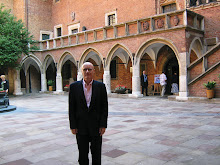Here's a recent op-ed on a need for a national dialog on race. Thought you might want to at least know about this upcoming conference.
Blogmeister, DeWitt Clinton
By William S. Cohen and Janet Langhart Cohen
Special to CNN
Editor's Note: William Cohen is a former Republican senator and defense secretary in the Clinton administration. His wife, Janet Langhart Cohen, is a former TV journalist, model and author. They are the co-authors of "Love In Black and White," a memoir about race, religion and their experiences as an interracial couple.
William Cohen and Janet Langhart Cohen say that U.S. racial prejudice is still too divisive to be history.
(CNN) -- In 1835, Alexis DeTocqueville, in his seminal work, "Democracy in America," prophesied that the abolition of slavery would not eliminate racial prejudice, which he declared was "immovable."
Sen. Barack Obama, in running for the presidency of the United States, is challenging DeTocqueville's bleak assessment of the human heart. It remains unclear whether the Illinois senator is on a hopeless mission, or whether the American people will decide to make history by breaking with it.
Any discussion of race or racism inevitably stirs uncomfortable reactions. America is, indeed, a nation of immigrants. Most of our ancestors came here in search of a better life. Africans, however, arrived here in chains to make a better life for others. Yet to date, we have been unable to discuss the horrors of the enslavement, lynchings, segregation and degradation of African-Americans without prompting resentment or indifference.
"That's all in the past," is a common retort. "We had nothing to do with it. It's history. Get over it." The problem, however, as the results in a number of the primary states reveal, is that racial prejudice is not history, and neither whites nor blacks are over it.
While Obama has moved the subject of prejudice out from the shadows, more than his exotic name, origin and religious affiliation are at issue. When Colin Powell, one of America's most accomplished military leaders and diplomats, contemplated running for the presidency in 2000, his family feared for his safety. Also, during that same year, when Sen. John McCain ran for our highest office, he was the victim of a vile, racist smear in South Carolina.
There are deep grievances held by black Americans over their past and present treatment by the white majority and equally profound resentments held by many whites over what they see as preferential treatment for the black community. Unfortunately, a discussion of the racial divide in our country is too often reduced to sound bites or shouting matches. Moreover, the preachings and exhortations of several prominent religious leaders, rather than nurturing and appealing to our spiritual needs, have instead served to inflame passions and reinforce old falsehoods and antagonisms.
We are convinced that what is needed in America is a serious, open, civil dialogue on racial, ethnic and religious prejudice. To this end, in July, we are convening a conference in Washington on race and reconciliation with political, spiritual and business leaders. Our goal: to further a national conversation about the need for truth, tolerance and reconciliation.
The opinions expressed in this commentary are solely those of the writers.
This blog provides a brief glimpse of the life of a retired professor of English, with topics ranging from the state of poetry, religion and philosophy, yoga, older athletes and who knows what else might develop. Send a comment if you wish to: clintond@uww.edu
DeWitt Clinton

DeWitt Clinton
About Me

- DeWitt Clinton
- Milwaukee, Wisconsin, United States
- DeWitt Clinton has just finished a long career of teaching and mentoring students at the University of Wisconsin—Whitewater, USA. His essay on travelling in Poland has just appeared in Cultural Studies<=>Critical Methodologies. His newest poetry collection is an adaptation of Kenneth Rexroth’s 100 Poems from the Chinese. A few poems from this manuscript have appeared in Cha, qarrtsiluni, and Verse Wisconsin.